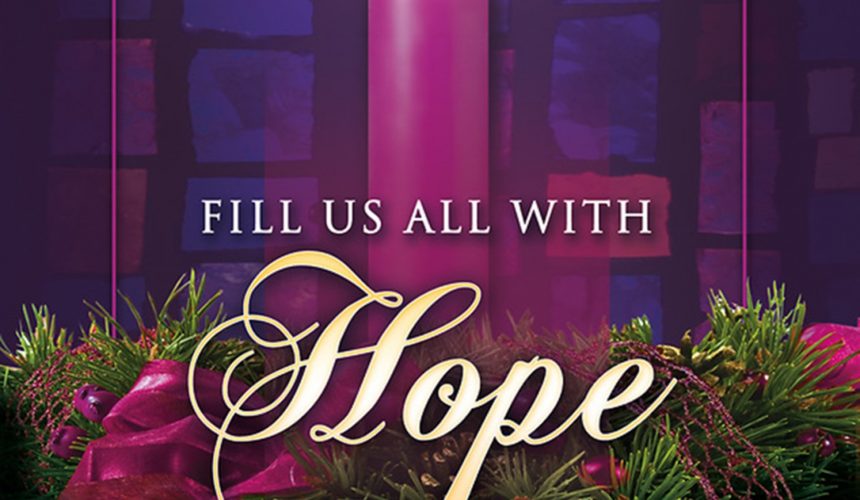THEMES:
Hope – waiting, expectant
And so, we reach the start of a new year in the Church Calendar – Advent Sunday. The word “Advent” means “arrival”, and in the next few weeks, we will be learning to recognise the arrival of Christ among us. This season is both a preparation for Christmas – the celebration of the incarnation – and a reflection on the consummation of all things.
The first Sunday in Advent always focuses on what we now call the return of Christ. This is to remind us that our world is going somewhere. There is a purpose, a direction and a meaning to the created order, and God is at work to fulfil that purpose – to bring all things into wholeness and unity in Christ. The Christmas celebration, then, is not a “stand-alone” event. The incarnation can only really be understood in terms of God’s saving purpose for all creation.
The key word for the Advent season is “watch.” God’s Reign is not just something we wait for. Our salvation is not just about going to heaven when we die, or about living until the glorious return of Christ. God’s Reign is always coming to us. Jesus is always being incarnated among us. Our salvation is a reality that we can embrace and experience now. For this reason, we are constantly called to watch, to be mindful and aware of God’s presence and activity among us. We are challenged to respond to God’s Reign as it seeks to enter our lives, and to become messengers who proclaim God’s salvation through our lives and words. This week we explore how we can become watchful followers of Christ.
How can we participate in the coming reign of Christ? That is the challenge of Advent. God promises a new order, the birth of a world in which justice and righteousness rule. The promise is irrevocable—the birth will come. Whether we are among those who will be reborn with that world depends upon our commitment and allegiance, in each moment of our lives, to the one true God rather than the false gods we so often honour. God shows us the way in the life and words of Jesus and gives us companions— our sisters and brothers in Christ. But ultimately, each of us must actively prepare if we are to be part of what is being born at Christmas.
Jeremiah 33:14-16: Weak and vacillating leadership by the current king of Judah was leading the nation into disobeying the will of the Lord, and consequently they were heading towards his judgment. Jeremiah stood up against the popular political swell of support for this movement of the court towards national disaster. This brought down on him universal anger and hatred. Yet he could see ahead to a time when, despite what judgments God would bring, there would arise a Messianic King, a shoot from the present fallen stump of the house of David. This King would rule in perfect righteousness. His kingdom would therefore also carry that name of ‘righteousness’. Jesus the Christ is the true fulfilment of this prophecy.
1 Thessalonians 3:9-13: We receive here an insight into Paul’s love and concern for his converts. It led him to be overjoyed when he heard reports of living which was worthy of the gospel. His desire to return personally to affirm and confirm the Thessalonians in their faith was prominent in his prayers. He also offers the prayer here that the love of which he had heard might increase yet again and that the hope of the Lord’s glorious return might encourage and spur them on to even greater strengths in holiness.
Luke 21:25-36: Jesus is speaking about the coming destruction of the Temple and theconquest of Israel by the Roman Empire. The language he uses is taken straight out of the Old Testament prophets – especially the apocalyptic messages of Daniel. For example, verse 27 has echoes of Daniel 7:13 – which Jesus’ hearers would have recognised. This image is less about Jesus returning to earth than about Jesus returning to his eternal throne in glory because his task of winning salvation is completed.
Whenever biblical writers wanted to express the inexpressible glory and power of God’s activity in the world, they used images of natural upheaval. Their purpose is not to give a journalist’s report of future events, but to communicate the impact of God’s presence on the entire universe. When God acts, the effect resonates throughout creation. We need to be careful, then, not to take these images too literally, but to listen carefully for the message Jesus is trying to communicate – which is expressed in the parable of verses 29 & 30: “Watch out!” Live a life that keeps you mindful of God’s presence and purpose and pray at all times for God’s strength to remain faithful when tough times strike.
How can you be more aware of God’s presence and activity in your life today?
Do:
All the disciplines of our worship are designed to train us in mindfulness, but one of the most effective is the practice of invocation in which we invite God’s Spirit to fill us and empower us. As you go through today, constantly invite God’s Spirit to speak to you and lead you.
Pray:
Come, Holy Spirit, open my eyes and heart to your glorious presence

